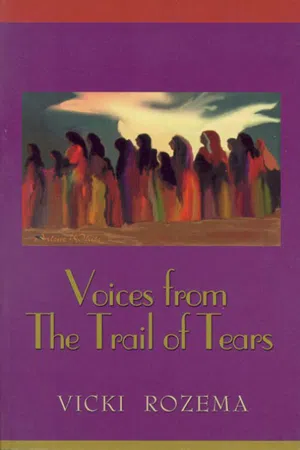
- English
- ePUB (mobile friendly)
- Available on iOS & Android
Voices From the Trail of Tears
About this book
During the first half of the 19th century, as many as 100,000 Native Americans were relocated west of the Mississippi River from their homelands in the East. The best known of these forced emigrations was the Cherokee Removal of 1838. Christened Nu-No-Du-Na-Tlo-Hi-Lu—literally "the Trail Where They Cried"—by the Cherokees, it is remembered today as the Trail of Tears. In Voices from the Trail of Tears, editor Vicki Rozema re-creates this tragic period in American history by letting eyewitnesses speak for themselves. Using newspaper articles and editorials, journal excerpts, correspondence, and official documents, she presents a comprehensive overview of the Trail of Tears—the events leading to the Indian Removal Act, the Cherokees' conflicting attitudes toward removal, life in the emigrant camps, the routes westward by land and water, the rampant deaths in camp and along the trail, the experiences of the United States military and of the missionaries and physicians attending the Cherokees, and the difficulties faced by the tribe in the West. "O what a year it has been!" wrote one witness accompanying a detachment westward in December 1838. "O what a sweeping wind has gone over, and carried its thousands into the grave." This book will lead readers to both rethink American history and celebrate the spirit of those who survived.
Vicki Rozema is the author of Cherokee Voices: Early Accounts of Cherokee Life in the East and Voices from the Trail of Tears. Also an acclaimed photographer, she is a history professor at the University of Tennessee. The first edition of Footsteps of the Cherokees received an Award of Merit from the Tennessee Historical Commission in 1996. Her honors include the 2014 McClung Award for an article that appeared in the 2013 Journal of East Tennessee History and the Native American Eagle Award for her writings on the Cherokee.
"This work, like Cherokee Voices, is a compilation of letters, newspaper editorials, journal excerpts, church records, and military documents, written by a diverse group of Cherokees and Euroamericans. As the title suggests, Voices from the Trail of Tears is a moving account of the forced removal of thousands of Cherokees in the 1830s; Rozema does a remarkable job of 're-creating this tragic period in American history by letting eyewitnesses speak for themselves.'" - Ginny Carney Studies in American Indian Literature
Frequently asked questions
- Essential is ideal for learners and professionals who enjoy exploring a wide range of subjects. Access the Essential Library with 800,000+ trusted titles and best-sellers across business, personal growth, and the humanities. Includes unlimited reading time and Standard Read Aloud voice.
- Complete: Perfect for advanced learners and researchers needing full, unrestricted access. Unlock 1.4M+ books across hundreds of subjects, including academic and specialized titles. The Complete Plan also includes advanced features like Premium Read Aloud and Research Assistant.
Please note we cannot support devices running on iOS 13 and Android 7 or earlier. Learn more about using the app.
Information
Table of contents
- Cover
- Title
- Copyright
- Dedication
- Contents
- Preface
- Epigraph
- Introduction
- I Hope My Bones Will Not Be Deserted by You—1821 and 1829
- First Blood Shed by the Georgians—February 1830
- The Enemies of Georgia—1831
- That Paper Called a Treaty—March 1836
- Your Fate Is Decided—March 1837
- The Talk—August 1837
- Too Sick to Travel—October-December 1837
- A Distance Short of 800 Miles—January 1838
- Under Weigh at Daylight—June 1838
- Feelings of Discontent—June-September 1838
- Until the Sickly Season Should Pass Away—July 1838
- For the Comfort and Well-being of This People—Summer 1838
- The Sadness of the Heart—August 1838
- A Year of Spiritual Darkness—June and December 1838
- Hail, Rain, Wind and Thunder—March 1839
- One Old Man Named Tsali—November-December 1838
- Murdered from an Ambush—June 1839
- A Citizen of the State of North Carolina—1847 and 1858
- If Not Rejoicing, at Least in Comfort—1864
- Appendix 1: Guide to Cherokee Detachments, 1837-39
- Appendix 2: General Winfield Scott’s Removal Order No. 25
- Appendix 3: General Winfield Scott’s Removal Order No. 62
- Appendix 4: General Winfield Scott’s Circular to Cherokee Conductors
- Appendix 5: General John E. Wool’s General Order No. 74
- Endnotes
- Bibliography
- Index